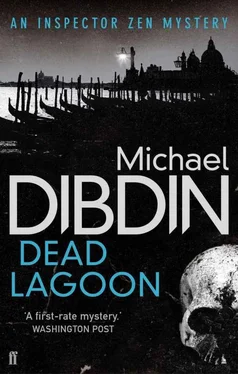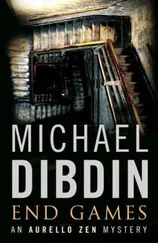Michael Dibdin - Dead Lagoon
Здесь есть возможность читать онлайн «Michael Dibdin - Dead Lagoon» весь текст электронной книги совершенно бесплатно (целиком полную версию без сокращений). В некоторых случаях можно слушать аудио, скачать через торрент в формате fb2 и присутствует краткое содержание. Жанр: Полицейский детектив, на английском языке. Описание произведения, (предисловие) а так же отзывы посетителей доступны на портале библиотеки ЛибКат.
- Название:Dead Lagoon
- Автор:
- Жанр:
- Год:неизвестен
- ISBN:нет данных
- Рейтинг книги:5 / 5. Голосов: 1
-
Избранное:Добавить в избранное
- Отзывы:
-
Ваша оценка:
- 100
- 1
- 2
- 3
- 4
- 5
Dead Lagoon: краткое содержание, описание и аннотация
Предлагаем к чтению аннотацию, описание, краткое содержание или предисловие (зависит от того, что написал сам автор книги «Dead Lagoon»). Если вы не нашли необходимую информацию о книге — напишите в комментариях, мы постараемся отыскать её.
Dead Lagoon — читать онлайн бесплатно полную книгу (весь текст) целиком
Ниже представлен текст книги, разбитый по страницам. Система сохранения места последней прочитанной страницы, позволяет с удобством читать онлайн бесплатно книгу «Dead Lagoon», без необходимости каждый раз заново искать на чём Вы остановились. Поставьте закладку, и сможете в любой момент перейти на страницу, на которой закончили чтение.
Интервал:
Закладка:
She laughs.
‘I know they’re stupid! No, I’m talking about my visitors. They’re far too sly to let themselves be caught by some flat-foot from Ferrara. Swamp-dwellers! They all have malaria, poor things. Runs in the family, rots their brains.’
‘When was the last occurrence of this kind?’ the man inquires in a decidedly supercilious tone.
‘Last night,’ Ada replies pertly. ‘It was almost dawn by the time they finally left me in peace.’
‘What happened?’
‘The same as usual. It’s the skeleton I’m most frightened of. It makes such sudden rushes at me.’
‘How many of them are there?’
Ada shrugs, as if considering the matter.
‘It’s hard to tell. They come and go. Often I’ve thought they’ve gone, then suddenly another one pops out from somewhere.’
‘Have they attacked you?’
She shakes her head.
‘They just try and scare me, keep me awake all night, never knowing what’s going to happen next.’
The man considers her for a long time.
‘How do they get in?’ he asks.
‘Don’t ask me! They just appear. In my bedroom it was last time. A light came on, I woke, and there they were.’
Despite herself, her voice shakes slightly as she remembers her terror.
‘Was the front door locked?’
‘Locked and bolted, as always. But nothing stops them.’
She pulls up the sleeve over her dress and displays a livid patch on her arm.
‘There! That’s what I got from bumping into one of them. There are others, too, not decent to be viewed. I showed the doctor, though.’
The man nods.
‘I’ve read the file on your case,’ he says. ‘The medical evidence is apparently inconclusive. The contusions could have resulted from a collision with some household object. A chair or table, for example.’
‘Do they think I go staggering about bumping into the furniture like some drunk?’ Ada protests. ‘Anyway, what about the mud?’
‘The report mentioned some marks on the floor. There was no sign of shoe tread or other distinguishing features.’
He sighs deeply.
‘You see the problem is, contessa, that after what happened before, people are disinclined to believe what you tell them.’
‘I can’t help that,’ returns Ada flatly.
‘On that occasion, you were convicted of causing a public nuisance by calling your deceased daughter Rosetta home every evening. You subsequently spent two years in a mental institution where you were diagnosed as suffering from persistent delusions. It is therefore only natural that without some concrete evidence that the phenomena you now describe have any reality outside your own imagination, it is going to be difficult if not impossible for me to take the matter further.’
‘I didn’t ask you to come,’ Ada retorts.
Her visitor takes a notebook from his pocket and writes something on a page which he tears out and hands to her.
‘That’s my number,’ he says. ‘I’m only just round the corner, in the old house. If this happens again, give me a call, whatever the time, day or night.’
Ada looks at the number, then at his eyes. She nods.
Leaving the palazzo, Aurelio Zen turned left into an alley so narrow he had to walk sideways, like a crab. It seemed to come to a dead end at a small canal, but at the last moment a portico was revealed, leading to a bridge. The tide was out and the water had shrivelled to a gutter a few centimetres deep between fat expanses of black slime where tethered boats lolled like capsized beetles. A little further along the canal, the elegant facade of Palazzo Zulian stood out from its neighbours.
The air, walled off from the prevailing breezes, was heavy with the stench of mud. An assortment of debris was visible at the bottom of the water: the wheel of a pram, a punctured bucket, a boot. A large rat slithered across the mud and hopped into an open drain. In older buildings, people still kept a heavy stone on the toilet cover to stop the creatures from getting loose in the house.
The alley scuttled off between the houses on the other side, eventually joining a broader street with shops and a church. Zen made his way past doors whose numbers read like the dates of an impossible life: 1684–1679, 1635–1628. He crossed a bridge where a man was manoeuvring a handcart laden with cans of cooking oil up the ridged pavement on the wheels fitted to the leading edge. The house opposite was clad in scaffolding and sacking, with a large plastic chute to carry waste rubble to a barge moored alongside, now aground in the mud. A workman was shovelling sand out of another boat into a wheelbarrow which his mate was holding on the plank bridge they had rigged up.
Zen squinted at the frontage. Surely that was where the Pagan family lived? The two boys had been at school with him, although they were never part of the same set. Presumably they must have inherited by now and were having the place done up. He was surprised to feel a stab of envy. If only he could afford to have the Zen house turned into a proper home for all of them, with a separate flat for his mother and plenty of space for him and Tania…
He immediately dismissed the idea. It was absurd to think that he could make a life for himself here at this late stage. There was nothing here for him now. He had used the place up, converted it to experiences and memories that made up the person he was. To return would be to condemn himself to a form of spiritual incest. Nothing new could happen to him here, nothing real. Besides, Tania wouldn’t want to move to a city which, despite its glamour, was essentially a provincial backwater. He walked on, frowning at the realization that this was the first time he had thought of Tania since his arrival.
Under the flat bland noonday light, the wedge-shaped campo looked like a small-scale replica of itself, a set of mocked-up frontages. How different it seemed in the eye of memory! Grand in stature, full of significance, peopled with a vast and various cast of every age and character, inexhaustible and yet coherent… Now it looked diminished, paltry and deserted. The city was dying. The paper Zen had bought earlier that morning had spelled out the grim rate of attrition. The preceding twenty-four hours had seen six births and twenty-one deaths. Twenty-one unique and irreplaceable repositories of local life and lore had been destroyed, while most of the six new citizens would be forced to emigrate in search of work and accommodation. In another fifty years, there would be no Venetians left at all.
Of all the houses in the neighbourhood, the Morosinis’ had been the liveliest and most welcoming. It was identical in size and layout to the Zens’, yet the two homes could hardly have been more different in every other way. The Cannaregio area was midway between the station and the slaughterhouse, and most local men worked for one or the other. Like Aurelio’s father, Silvio Morosini was a railwayman, and he had taken full advantage of this once the war came. No heroics for Silvio, who had decidedly left-wing sympathies but also an uncanny sense of which way the wind was blowing and when to keep his head down.
Angelo Zen could also have claimed exemption — the railways were then the sinews of both the economy and the war effort — but he had preferred to volunteer and was sent off to serve in the ill-trained and worse-equipped token force which Mussolini dispatched to the Russian front in order to bolster his status with his German ally. There Angelo had disappeared, along with the tens of thousands of other Italians unaccounted-for and presumed dead. The growing certainty of that death, coupled with the lack of any proof which would permit its recognition, had infiltrated the Zen household like an icy draught from the frozen battlefields and prison camps where the Armata Russa had met its miserable and ignominious fate.
Читать дальшеИнтервал:
Закладка:
Похожие книги на «Dead Lagoon»
Представляем Вашему вниманию похожие книги на «Dead Lagoon» списком для выбора. Мы отобрали схожую по названию и смыслу литературу в надежде предоставить читателям больше вариантов отыскать новые, интересные, ещё непрочитанные произведения.
Обсуждение, отзывы о книге «Dead Lagoon» и просто собственные мнения читателей. Оставьте ваши комментарии, напишите, что Вы думаете о произведении, его смысле или главных героях. Укажите что конкретно понравилось, а что нет, и почему Вы так считаете.











